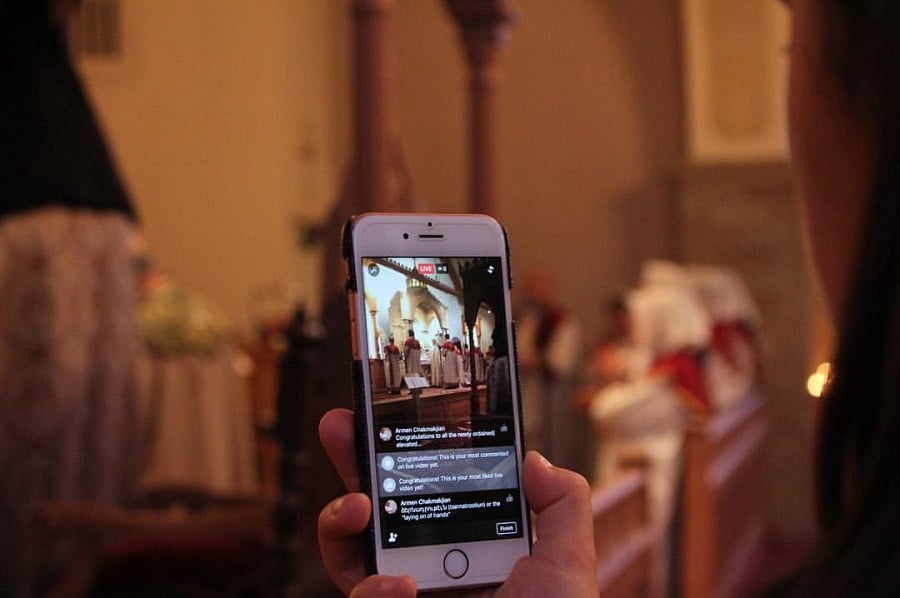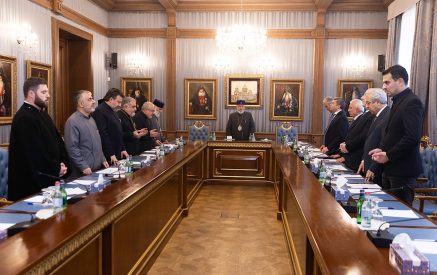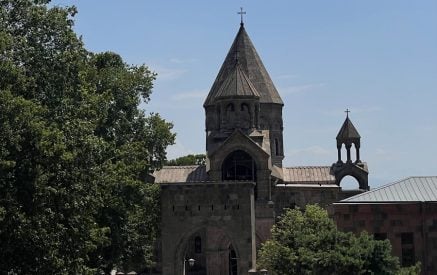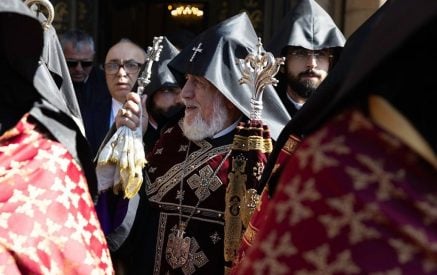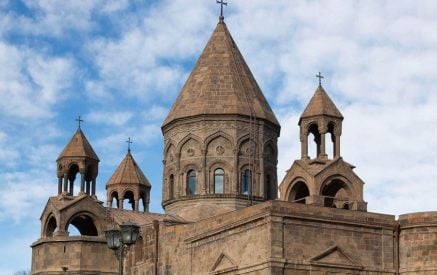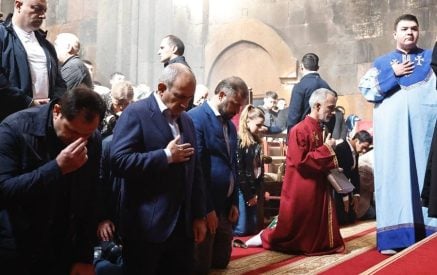Armenian Weekly. A few weeks ago, while driving to church services, I passed by a local YMCA. It was a beautiful Sunday morning, with the last vestiges of a fading winter in the air. The building was modern, with exquisite landscaping, but what caught my attention was the parking lot—it was full of patrons. Across the street was a crowded Target. I couldn’t help but wonder why people can get up early on a Sunday morning to exercise or shop, but feel little connection to communal worship.
An obvious disclaimer is that not all these cars belonged to Christians who had worshipped on Saturday night. Nevertheless, I think you get the point. Sunday was once a special time for Christian worship, yet over the past 50 years, it has been overtaken by sports, leisure and shopping. I have always been intrigued by whether the causes of our decline can be attributed to the limits of our individual faith or our estrangement from the institutions commonly referred to as the Church. For Christians, this crisis has been widespread for decades, and as Armenian Christians in America, we are not exempt.
There has been a tendency to mix the core causes into one bowl, but they are actually quite distinct. For Christians, our relationship with our Lord and Savior Jesus Christ is the essence of faith. Despite our families, communities and institutions, our faith is personal and individual. Many Christians practice their faith privately and avoid affiliation with an institution. They may find it too restrictive or confining and are comfortable in their privacy. Thousands of Christians have left traditional institutions such as the Catholic Church and Orthodoxy for newly established churches that focus less on the traditions of the institution and more overtly on the Bible and Christ’s teaching.
This is not to say that traditional churches are not Bible-based, but they also maintain long standing traditions and history that are less important to some Christians. The Soorp Badarak of the Armenian Church, for instance, is a biblical service that reenacts the Last Supper, where the Eucharist was established and Our Lord asked us to do this in “remembrance of me.”
Read also
It is a sad reflection of our lack of understanding that many Armenians are critical of the length of the service and less aware of the Christ-based foundation of our service. Several years ago, I met a non-Armenian woman who attended Badarak, and she was thrilled to find our service full of scripture and immediately connected with our church. The language did not pose an obstacle since the institution connected with her individual faith and love of Christ. I learned that day that, without faith, the language issue remains secondary.
Most Armenians identify as Christians, yet our churches are modestly attended on most Sundays. The exceptions are the C&E days—Christmas and Easter—when churches are full and all is well. In larger parishes, weekly attendance might reach a few hundred, but that number can be deceiving when the surrounding Armenian population may be many times greater. Faith is a relationship, but it begins as a value in your learning environment. Bringing children to church is a repetitive process that instills the importance of praising God.
In the past, when Armenians lived in more dense, three-generational families, life was simpler and the focus was on our role models. Many of us watched our elders—without the distractions of phones, videos and activities that inundate our children today. Unfortunately, teaching faith today competes with short-term worldly adventures. It is the parents’ responsibility to understand what is important in their child’s development. Our increasingly secular world teaches children that they can do anything—on their own. The concept of a loving God is avoided, and God becomes a “safety valve” when we want something such as health, wealth or success.
Faith is best nurtured in the home, where it becomes a living part of our lives. Our love and dependence on God grow with our families. As that responsibility has been challenged, the Church has taken on a larger role. How many parents discuss the faith education their children receive at church when they go home? Abdicating this primary responsibility to the Church is one thing, but failing to reinforce it at home only deepens the problem. Given these circumstances in the home and secular community, we are not giving our children what they need. The problem is compounded by sparse attendance, which impacts the quality of the education.
There is no question that our Church has been slow to respond to these challenges, particularly in the diaspora. If we are to improve as a community, then the focus must be on building faith. I have attended the Armenian Church all my life, but it was not until my personal relationship with Jesus Christ grew that my commitment to the Church became eternal. I am certain that I am not alone. As a community, we worry about the wrong things. Financial concerns dominate Diocesan, Prelacy and parish assemblies.
It has always been the most popular break out session at the Diocesan or NRA (National Representative Assembly) assemblies. In my view, churches don’t close because of financial problems.
A lack of the faithful is usually the cause. If a parish announced to its congregation that it would have to close if it didn’t raise $50,000 in the next month, my guess is that the funds would be raised with contributions from near and far. Yet, when our clergy practically plead with people to participate in communal worship, the results are modest. It illustrates that we want the Church to be here for our own needs (weddings, funerals, hokehankist services or holidays)—but we leave the work to others.
In a strange twist of irony, it seems that poor attendance does not reflect a lack of financial support, yet how can we expect the remaining faithful to maintain capability? This is where the distinct causes of our decline—faith and institutional participation—intersect and impact each other. We must never lose sight of the fact that our faith is the foundation of not only our personal salvation, but also the rock with which we build our communal worship institution: the Armenian Church.
The solution lies within each of us as individuals as well as the appropriate evolution of the Church itself. As a father and grandfather, I must not only take responsibility for my own relationship with God, but also serve as a spiritual role model for our children and grandchildren. Building that foundation starts at birth, but too often we think there is always “tomorrow” when it comes to faith, especially as sports and leisure activities consume our urgency. But shallow, fleeting pleasures should never come at the expense of an eternal faith.
Teaching our children to give thanks at meals and pray at bedtime gives them an understanding that there is a higher authority who loves them unconditionally. The concept of a Godfather and Godmother in the Armenian Church only starts with the ceremonial baptism. Godparents are responsible for the spiritual mentoring of the child. Sadly, this tradition has mostly transitioned into a “one and done” social experience where individuals may declare they are godparents but rarely take on spiritual development.
The Holy See of Cilicia has declared 2025 as the Year of the Revitalization of Traditions. I would humbly request that we accept the challenge of renewing the tradition of the Godparents in the spiritual development of our children. Perhaps our priests can counsel Godparents just as they meet with couples to be married to encourage their responsibility. The most effective way, of course, is for the parents who selected the Godparents to insist that they take the responsibility seriously. All these efforts will bring positive improvement in the faith development of our children. With faith, each of us can find a home in our church and add to its capability.
These are simple and practical suggestions that will help us avoid being overwhelmed with the challenge. Once these pieces are in place, we can move to family dialogue. We should bring our children to church. The years go by quickly, and let’s not guilt ourselves on what we should have done. We should follow the model most of us follow with public schools: we ask our children what they learned and review the papers they bring home. Why not have a similar discussion about what they learned in Sunday School or from the priest’s sermon? Your participation in this process will give your children the message that you place importance on their spiritual growth.
The Church must continue to find ways to remain relevant. At face value, the hierarchical nature of the Armenian Church seems outdated for a widely diverse diaspora. A more decentralized model where bishops are empowered to make appropriate and local change would be more effective. We should remember that His Holiness Aram I talked not only about revitalizing traditions but also adapting in the diaspora. A rigid church that appeals to a few cannot survive.
We should not fear change with a solid foundation of faith. We should fear irrelevance. We have a beautiful church with incredible depth that not enough people have internalized. The goals of relevance and adapting are not in conflict. We must unlock the treasures of the institution with the keys from our faith. Our faith is initially built on an individual basis but should grow into communal worship. Our Lord created the Church for that purpose. Christianity is a community experience based on mutual love and respect.
The Church has been there for the faithful for centuries. It is an institution worthy of our respect and participation. We need our personal relationship with Jesus Christ and communal worship to fulfill our faith. Our time on this earth is finite. Let’s take those precious steps together.




















































